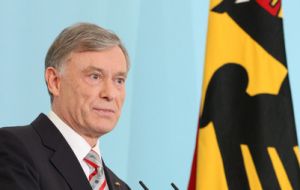MercoPress. South Atlantic News Agency
German president resigns on comments about military actions overseas
 President Horst Koehler, and former IMF chief, never expected such a reaction
President Horst Koehler, and former IMF chief, never expected such a reaction German President Horst Koehler unexpectedly resigned due to a storm over comments he made about military action abroad in a move that could cause conservative Chancellor Angela Merkel a headache.
The shock resignation comes at a time when Merkel is already battling a Euro zone debt crisis, sinking popularity and an increasingly awkward coalition partner.
Now she will have to find a new and successful candidate for president. Her conservatives had backed Koehler for re-election by a special assembly last year.
The German President is responsible for signing bills into law but the role is largely ceremonial.
“I regret that my comments could lead to a misunderstanding about an important and difficult question for our nation,” an ashen-faced Koehler told reporters in a statement called at short notice.
Koehler, 67, has already signed off on law allowing Europe's biggest economy to contribute to a 750 billion Euro emergency debt package and his resignation would not be expected to have a market impact.
As a former head of the IMF, Koehler has spoken out on the debt crisis enveloping the Euro zone but his departure will have little impact on German policy.
Koehler, in office since 2004, said in a radio interview just over a week ago that foreign military action by the German army also served economic interests.
A country like Germany with a heavy reliance on foreign trade, Koehler said, must know that “in emergencies military intervention is necessary to uphold our interests, like for example free trade routes, for example to prevent regional instabilities which could have a negative impact on our chances in terms of trade, jobs and income.”
Koehler said he was unhappy about the reaction to it.
“The criticism has gone so far as to suggest I supported deployments by the army which are not covered by the constitution. This criticism is completely unjustified,” he said. ”It shows a lack a respect for my office”.
The row and his resignation underscore the sensitivity of military issues in Germany.
A special Federal Assembly, made up of all the members of parliament and an equal number of delegates sent by the 16 state assemblies, elects German president.
Jens Boehrnsen, speaker of the parliament's upper house (Bundesrat), will be interim president. He is in the opposition Social Democratic Party (SPD).




Top Comments
Disclaimer & comment rulesCommenting for this story is now closed.
If you have a Facebook account, become a fan and comment on our Facebook Page!